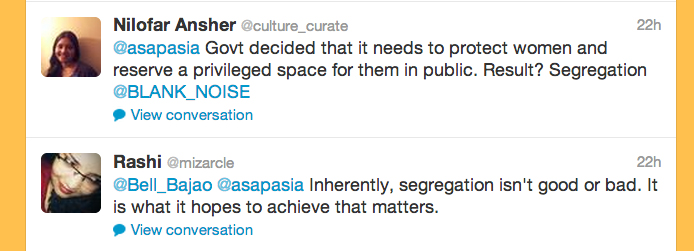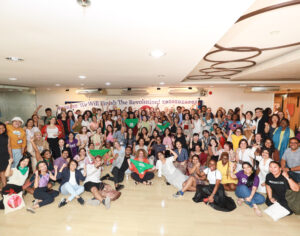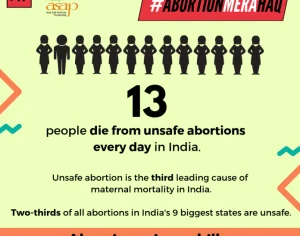A Space Of My Own: Does Segregation Stop Violence?
It’s always great when a blog gets a lot of comments, and Rape after Delhi did well yesterday on Twitter! It was heartening to see the support we received for our argument that a feminist response to rape is much better than one that reinforces the language and culture of violence. Thanks particularly to RHM Journal and Soroptimist International for their responses.

Surprisingly, we also just happened to chance upon Bell’s Bajao’s joint venture with Blank Noise on the creation of segregated, safe spaces for women as a measure to end sexual harassment. (Follow #EndSH for the entire conversation).
Blank Noise asked a great question that allowed the audience (including us) to think if we have benefitted from these segregated women-only spaces:
What segregated spaces have you been part of ?
And the most popular answer was: Toilets! (True Isn’t it!!)
But do women benefit from this segregation? This is what some of the other tweeters had to say:

(Thanks to these tweeters for keeping us in the loop!)
It’s true that segregated spaces do allow women to express themselves physically, verbally and sexually without wondering if this expression will lead to harassment. Very often women are taught to complete with each other for male attention in mixed spaces while in segregated spaces they benefit from strong friendships.
 But these merits do need closer examination, because at the end of the day segregated spaces are essential only in patriarchal societies, where men have greater power, and use this to condone violence and brutality. In fact, the mere existence os segregated spaces is proof that we live in a patriarchal world, where women have to fear men.
But these merits do need closer examination, because at the end of the day segregated spaces are essential only in patriarchal societies, where men have greater power, and use this to condone violence and brutality. In fact, the mere existence os segregated spaces is proof that we live in a patriarchal world, where women have to fear men.
Segregated spaces aren’t entirely novel; they’ve been part of patriarchal societies since ancient times. In fact, it is this long-term segregation that gifted public spaces to men. It is also the rationale behind the myth women are safe in their homes. It is also the unfortunate reason why we are largely unaware of the violence committed against children, particularly young boys, and the queer community.
Segregated spaces also foster a culture of shame and stigma. Women are taught to be secretive about their monthly menstrual cycles. Though it takes both a man and a woman to cause a pregnancy, contraception and abortion are still largely discussed as women’s issues! Male involvement in these matters seems harder than putting a man on the moon!
Segregation has also kept myths about gender roles alive: our divided spaces tell us that there are things men do and there are things women do; and when they do similar things, there is a manly way of doing it and a womanly way of doing it. And thus we become alienated sexes — men apparently belong in Mars, women in Venus.
So, should we encourage segregated spaces? There is no simple answer to that. We may not be able to get rid of them just yet because they do provide security and freedom given this patriarchal world we live in, but if we are spending resources on increasing security, it should go towards social transformation not further segregation. In an ideal world, one half of the species should not have to hide from the other half; and that is the ideal we should work towards. As one of the tweeters said, if there is segregation let is be for toilets alone!





















